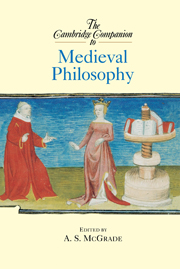Book contents
- Frontmatter
- Introduction
- 1 Medieval philosophy in context
- 2 Two medieval ideas: eternity and hierarchy
- 3 Language and logic
- 4 Philosophy in Islam
- 5 Jewish philosophy
- 6 Metaphysics: God and being
- 7 Creation and nature
- 8 Natures: the problem of universals
- 9 Human nature
- 10 The moral life
- 11 Ultimate goods: happiness, friendship, and bliss
- 12 Political philosophy
- 13 Medieval philosophy in later thought
- 14 Transmission and translation
- Chronology of philosophers and major events
- Biographies of Major Medieval Philosophers
- Bibliography
- Index
9 - Human nature
Published online by Cambridge University Press: 28 May 2006
- Frontmatter
- Introduction
- 1 Medieval philosophy in context
- 2 Two medieval ideas: eternity and hierarchy
- 3 Language and logic
- 4 Philosophy in Islam
- 5 Jewish philosophy
- 6 Metaphysics: God and being
- 7 Creation and nature
- 8 Natures: the problem of universals
- 9 Human nature
- 10 The moral life
- 11 Ultimate goods: happiness, friendship, and bliss
- 12 Political philosophy
- 13 Medieval philosophy in later thought
- 14 Transmission and translation
- Chronology of philosophers and major events
- Biographies of Major Medieval Philosophers
- Bibliography
- Index
Summary
Nothing in medieval philosophy was more fiercely contested than the topic of human nature. Among the many questions discussed were the nature of the soul, the relationship between the soul and the mind, the workings of sense and intellect, the role of the passions, the limits to human freedom, and the extent of our dependence on divine grace and illumination. Yet these disputes, though wide-ranging, were fought in the context of general agreement on a number of basic issues. There was general agreement that human beings have a soul but are not merely souls – that they are composites of soul and body. There was also agreement that the human soul is immaterial and created by God; it does not come into existence naturally, as the souls of other animals do. Likewise, almost all agreed that the soul does not preexist the body, that God brings it into existence once the fetus has sufficiently developed, and that, once created, the soul will exist forever – that it is incorruptible. The story of medieval thinking on human nature concerns how this general framework was developed in various and conflicting ways and how these various theses could be proved philosophically – if indeed they could be proved at all.
MIND AND BODY AND SOUL
It is hard to imagine a more impressive start to medieval thinking about human nature than the writings of Augustine. “Refuse to go outside,” he advised. “Return to yourself.
- Type
- Chapter
- Information
- The Cambridge Companion to Medieval Philosophy , pp. 208 - 230Publisher: Cambridge University PressPrint publication year: 2003
- 14
- Cited by



